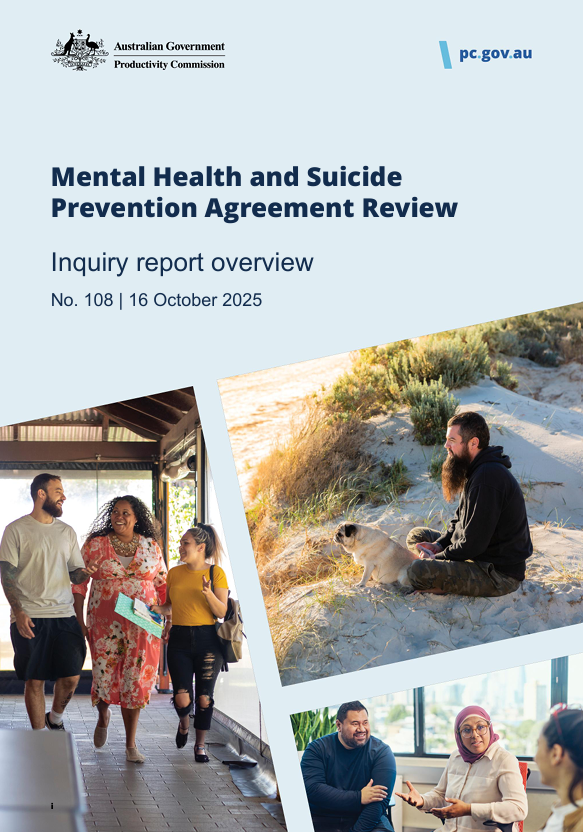Mental Health and Suicide Prevention Agreement Review

Inquiry report
The Productivity Commission was asked to conduct the final review of the National Mental Health and Suicide Prevention Agreement.
The review found the Agreement is not effective and a new policy architecture is needed to articulate the collective actions that will deliver changes to the mental health and suicide prevention system and improve outcomes.
This report was sent to Parties to the National Agreement on 17 October 2025 and publicly released on 11 November 2025.
Download the report
- The mental health and suicide prevention system is fragmented and out of reach for many people. The National Mental Health and Suicide Prevention Agreement represents the commitment of governments to work together towards a person centred, integrated mental health and suicide prevention system.
- Under the Agreement, the Australian, state and territory governments committed to progress an ambitious set of outcomes through national outputs and specific actions contained in bilateral schedules.
- The actions in the Agreement do not advance system reform.
- Consumers, carers and providers report services remain uncoordinated, unaffordable and difficult to navigate. This is despite some progress in implementing actions under the Agreement and the substantial efforts of many working across mental health and suicide prevention services.
- Key commitments in the Agreement have not been delivered and should be completed as a priority.
- State and territory governments should immediately prioritise addressing the gap in psychosocial supports outside the National Disability Insurance Scheme that is affecting 500,000 people. Ongoing funding arrangements for these services should be included in the next agreement.
- Governments should publish the completed National Stigma and Discrimination Reduction Strategy and comprehensive guidelines on regional planning and commissioning for primary health networks.
- A new policy architecture is needed to articulate the collective actions that will deliver changes to the mental health and suicide prevention system and improve outcomes.
- To be effective, the new policy architecture should be developed by governments in a process of co-design with people with lived and living experience of mental ill health and suicide, their supporters, family, carers and kin as well as service providers and practitioners.
- The current Agreement should be extended until June 2027 to allow sufficient time for co-design of the new policy architecture. This architecture should include:
- a Mental Health Declaration, signed by First Ministers, which will set the long-term direction for reform in conjunction with the National Suicide Prevention Strategy
- a five-year national agreement to tackle key priorities in the short term
- new governance, accountability and funding structures to underpin whole-of-government action
- separate schedules on services for Aboriginal and Torres Strait Islander people, services distinctly focused on suicide prevention, and services for people experiencing co-occurring problematic use of alcohol and other drugs and mental ill health and/or suicidal distress.
- The next agreement should comprise:
- clear objectives relating to the long-term vision set out in the National Suicide Prevention Strategy and Mental Health Declaration
- specific and measurable outcomes focusing on key priorities for the next five years
- tangible commitments clearly linked to the objectives and outcomes.
- The next agreement should formalise the role of the National Mental Health Commission as the independent entity responsible for assessment and reporting on progress.
- Preliminaries: Cover, Copyright and publication detail, Transmittal letter, Terms of reference, Contents, Disclosure of interests, and Acknowledgements
- Overview
- The Agreement is not fit for purpose
- Urgent actions are needed before the Agreement expires
- A new agreement can improve consumer outcomes
- A new schedule to strengthen Aboriginal and Torres Strait Islander social and emotional wellbeing
- A new schedule on suicide prevention to support action under the new National Suicide Prevention Strategy
- A new schedule addressing the co-occurrence of problematic use of alcohol and other drugs, mental ill health and suicidal distress
- Recommendations and findings
- What we heard
- Reflections from submissions
- Reflections from meetings and visits
- Reflections from public hearings
- Reflections from roundtable discussions
- Reflections from the online survey
- 1. The role of the Agreement and this review
- 1.1 The National Mental Health and Suicide Prevention Agreement
- 1.2 The PC’s approach to reviewing the Agreement
- 2. What has the Agreement achieved?
- 2.1 What do we know about the state of the mental health and suicide prevention system?
- 2.2 Assessing progress is not straightforward
- 2.3 Some progress has been made on the Agreement’s commitments
- 2.4 Key commitments have not been fulfilled
- 2.5 Progress towards a coordinated, person-centred system is very slow
- 3. Is the Agreement effective?
- 3.1 The Agreement has not been set up for success
- 3.2 Agreement does not embed the voices of people with lived and living experience
- 3.3 The Agreement’s governance lacks effectiveness and accountability
- 3.4 The Agreement is not enabling reform
- 4. Laying the groundwork for a better agreement
- 4.1 Governments should articulate national directions
- 4.2 The next agreement should have clear goals
- 4.3 Developing the next agreement
- 4.4 Addressing policy gaps in the next agreement
- 5. Effective governance and accountability
- 5.1 Progressing whole of government action
- 5.2 A new governance approach is needed
- 5.3 Giving consumers, carers and service providers a voice in the next agreement
- 5.4 Accountability mechanisms must be bolstered
- 5.5 Moving from fragmentation to integrated services
- 6. Funding and commissioning
- 6.1 Agreement funding can be directed more effectively
- 6.2 Commissioning integrated and locally relevant services
- 7. Services for Aboriginal and Torres Strait Islander people
- 7.1 Aboriginal and Torres Strait Islander social and emotional wellbeing
- 7.2 The Agreement includes commitments to improve social and emotional wellbeing
- 7.3 What progress has been made?
- 7.4 The next agreement
- 8. Suicide prevention
- 8.1 What progress has been made?
- 8.2 Suicide prevention is not well set up in the Agreement
- 8.3 Suicide prevention in the next agreement
- 9. The intersection of alcohol and other drugs with mental ill health and suicidal distress
- 9.1 Co-occurring problematic AOD use, mental ill health and suicidal distress
- 9.2 Government policy does little to tackle the challenge of co-occurrence
- 9.3 Service providers are hampered by a lack of funding and policy action
- 9.4 AOD in the next agreement
- A. Public consultation
- A.1 Engagement
- A.2 Online survey methods and sample
- Glossary and abbreviations
- References
Printed copies of this report can be purchased from Canprint Communications.


